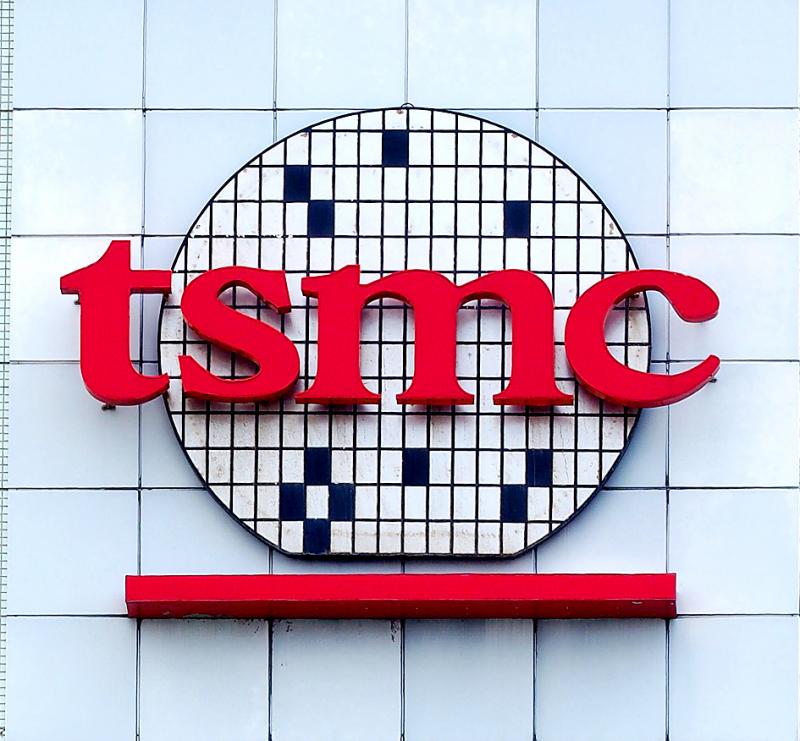Taiwan Semiconductor Manufacturing Co (TSMC, 台積電) has stopped new orders from Huawei Technologies Co (華為) in response to Washington’s move aimed at further limiting chip supplies to the Chinese company, the Nikkei reported yesterday, citing multiple sources.
The orders that TSMC took before the new ban and those that were already in production are not affected, and could continue to proceed if those chips could be shipped before the middle of September, the report said.
TSMC, the world’s biggest contract chipmaker and a key Huawei supplier, on Thursday last week announced plans to build a US-based plant and on Friday added that it was “following the US export rule change closely.”

Photo: David Chang / EPA-EFE
A new rule, unveiled on Friday by the US Department of Commerce, expands US authority to require licenses for sales to Huawei of semiconductors made abroad with US technology, vastly expanding its reach to halt exports to the world’s No. 2 smartphone maker.
TSMC said it does not disclose order details and added that the report was “purely market rumor.”
Huawei yesterday assailed the latest US move to cut it off from semiconductor suppliers as a “pernicious” attack that would sow chaos in the global technology sector and other industries.
“The decision was arbitrary and pernicious, and threatens to undermine the entire [technology] industry worldwide,” a Huawei spokesman said.
Huawei, which has largely weathered an escalating 18-month campaign by US President Donald Trump’s administration to isolate it internationally, said its business “will inevitably be affected” by the new American salvo.
It would “impact the expansion, maintenance and continuous operations of networks worth hundreds of billions of dollars that we have rolled out in more than 170 countries,” it said.
The statement was issued during an annual summit of technology analysts that it organizes at its headquarters in Shenzhen, China.
“This decision by the US government does not just affect Huawei,” it said. “It will have a serious impact on a wide number of global industries” by creating uncertainty in the chip sector and technology supply chains.

KEEPING UP: The acquisition of a cleanroom in Taiwan would enable Micron to increase production in a market where demand continues to outpace supply, a Micron official said Micron Technology Inc has signed a letter of intent to buy a fabrication site in Taiwan from Powerchip Semiconductor Manufacturing Corp (力積電) for US$1.8 billion to expand its production of memory chips. Micron would take control of the P5 site in Miaoli County’s Tongluo Township (銅鑼) and plans to ramp up DRAM production in phases after the transaction closes in the second quarter, the company said in a statement on Saturday. The acquisition includes an existing 12 inch fab cleanroom of 27,871m2 and would further position Micron to address growing global demand for memory solutions, the company said. Micron expects the transaction to

Nvidia Corp’s GB300 platform is expected to account for 70 to 80 percent of global artificial intelligence (AI) server rack shipments this year, while adoption of its next-generation Vera Rubin 200 platform is to gradually gain momentum after the third quarter of the year, TrendForce Corp (集邦科技) said. Servers based on Nvidia’s GB300 chips entered mass production last quarter and they are expected to become the mainstay models for Taiwanese server manufacturers this year, Trendforce analyst Frank Kung (龔明德) said in an interview. This year is expected to be a breakout year for AI servers based on a variety of chips, as

Global semiconductor stocks advanced yesterday, as comments by Nvidia Corp chief executive officer Jensen Huang (黃仁勳) at Davos, Switzerland, helped reinforce investor enthusiasm for artificial intelligence (AI). Samsung Electronics Co gained as much as 5 percent to an all-time high, helping drive South Korea’s benchmark KOSPI above 5,000 for the first time. That came after the Philadelphia Semiconductor Index rose more than 3 percent to a fresh record on Wednesday, with a boost from Nvidia. The gains came amid broad risk-on trade after US President Donald Trump withdrew his threat of tariffs on some European nations over backing for Greenland. Huang further

Sweeping policy changes under US Secretary of Health and Human Services Robert F. Kennedy Jr are having a chilling effect on vaccine makers as anti-vaccine rhetoric has turned into concrete changes in inoculation schedules and recommendations, investors and executives said. The administration of US President Donald Trump has in the past year upended vaccine recommendations, with the country last month ending its longstanding guidance that all children receive inoculations against flu, hepatitis A and other diseases. The unprecedented changes have led to diminished vaccine usage, hurt the investment case for some biotechs, and created a drag that would likely dent revenues and